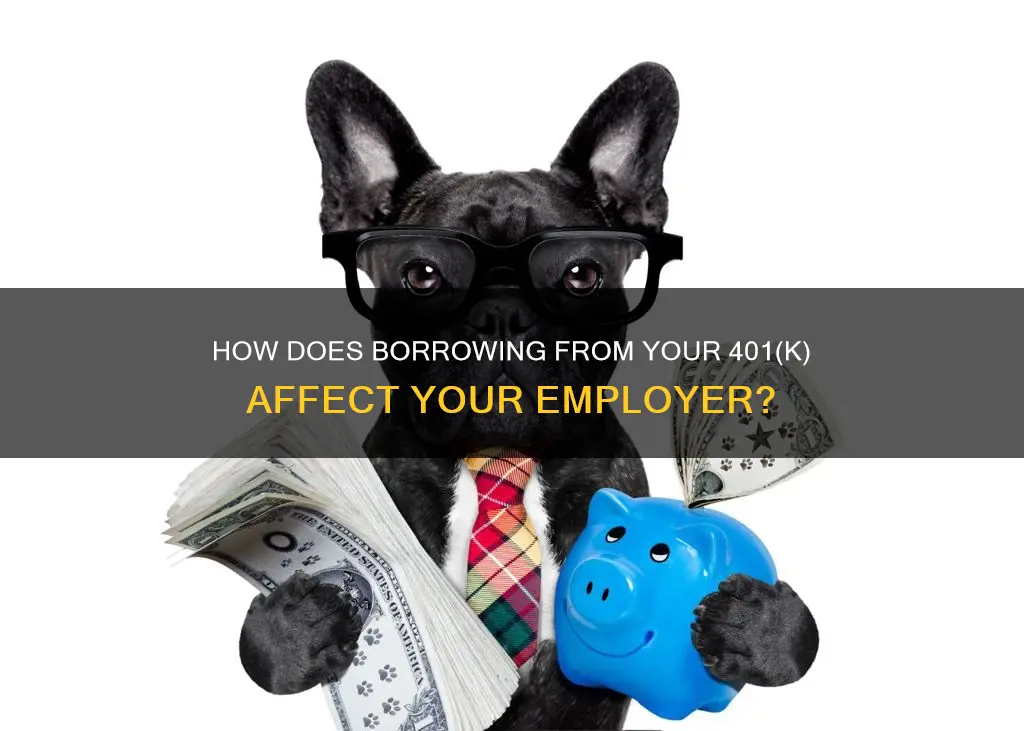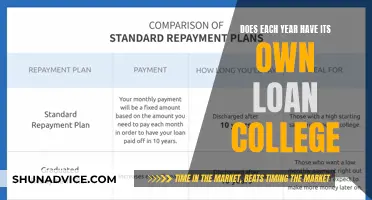
Taking out a loan from your 401(k) plan can be a double-edged sword. On the one hand, it provides quick access to funds during financial hardships, but on the other hand, it comes with certain drawbacks, such as losing potential growth on the borrowed money and facing double taxation. While your employer will likely know about your 401(k) loan due to payroll deductions for repayment, it generally won't impact your employment status unless your employer has specific policies in place. However, it's essential to understand the terms and conditions of your 401(k) plan, as well as explore alternative options before making a decision.
| Characteristics | Values |
|---|---|
| Who approves the loan? | The plan administrator, not the employer |
| Maximum loan amount | The lesser of $50,000 or 50% of the vested account balance |
| Exception to the maximum loan amount | If 50% of the vested account balance is less than $10,000, the participant may borrow up to $10,000 |
| Repayment period | 1 to 5 years for a general-purpose loan, up to 30 years for a residential loan |
| Repayment frequency | Quarterly |
| Interest | Paid back into the retirement account |
| Tax implications | Double taxation on interest, taxed as ordinary income if under 59 1/2 |
| Impact on employment status | Should not directly impact employment status, but may signal financial hardship |
| Impact on retirement savings | Loss of potential growth on the borrowed money |
What You'll Learn

Employers will know about a 401k loan as they process payroll deductions for repayment
Employers will likely know about an employee's 401(k) loan as they are often involved in processing payroll deductions for loan repayment. While individual managers may not have access to this information, it is generally known to the employer or payroll contractor when an employee takes out a 401(k) loan. This is because the repayment for the loan is typically deducted from the employee's payroll.
The availability of 401(k) loans depends on the specific rules and regulations set by the employer and the 401(k) plan. Some employers may choose to disallow 401(k) loans altogether, while others may have policies that prohibit employees from taking out such loans. It is important to note that the decision to offer a 401(k) loan feature is up to the employer and is often used to drive plan participation and boost employee financial wellness.
Taking a 401(k) loan typically does not directly impact an individual's employment status. However, borrowing from a 401(k) may signal to the employer that the employee is facing financial hardship, which could potentially raise concerns about their financial stability. Open communication between the employee and employer about financial situations and decisions regarding the 401(k) can help foster understanding and minimize any potential concerns.
It is worth noting that 401(k) loans have certain implications, such as the loss of potential growth on the borrowed money and double taxation. The money borrowed from the 401(k) must be repaid with after-tax dollars, and then it is taxed again when withdrawn. Additionally, if an employee falls behind on repayments, the outstanding loan balance will be considered a taxable distribution, impacting their tax filings.
EIDL Loan Advance: What's the Repayment Deal?
You may want to see also

A 401k loan may signal financial hardship, which could concern employers
A 401(k) loan is a loan taken out from your own workplace retirement account, with the condition that you pay back the borrowed amount with interest. While individual managers or coworkers will likely not have access to information about your 401(k) loan, your employer will technically know about it as they (or a payroll contractor) have to process the payroll deduction for repayment.
Although a 401(k) loan should not directly impact your employment status, it may signal to your employer that you are facing financial hardship or need immediate access to funds, which could be a cause for concern. This is because borrowing from your retirement account means losing the potential for that money to grow over time. Unless your employer has specific policies in place regarding 401(k) loans, it is unlikely that taking a loan will result in any immediate repercussions regarding your employment status.
It is important to remember that a 401(k) loan is a personal decision, and as long as you are able to repay the loan according to the terms set by your employer, it should not negatively impact your employment in the long term. However, if you were to separate from the company, you might find yourself in a difficult position if you cannot pay back the loan. Additionally, there can be serious tax implications for borrowing from your 401(k), and you may owe income taxes or even an additional 10% tax if you are under 59 1/2 years old.
Before taking out a 401(k) loan, it is recommended to explore all other options for extra money, such as emergency funds, additional savings, or taking on a side hustle. Consulting a financial advisor is also advised, as they can provide guidance on the potential tax and planning implications of tapping into different assets. While a 401(k) loan may be a convenient option, it is important to consider the potential consequences and treat it as a last resort.
Cosigning Auto Loans: Benefits and Risks for Borrowers and Cosigners
You may want to see also

401k loans are subject to double taxation
It is likely that your employer will know if you take out a loan against your 401k, as they or their payroll contractor will have to process the payroll deduction for repayment. However, this should not directly impact your employment status, and it is unlikely to result in any immediate repercussions.
Now, onto the topic of 401k loans and double taxation. When considering taking out a loan, it is important to evaluate your financial situation and consult a financial advisor, as each alternative has its own advantages and disadvantages. One of the potential disadvantages of 401k loans is the possibility of double taxation.
Double taxation occurs when a portion of your funds is taxed twice by the government. In the case of 401k loans, the borrower uses after-tax dollars to repay the loan, including interest. This means that when the borrower taps into their 401k account in retirement, they pay income tax on the amount again. For example, let's say you take out a $10,000 loan and over five years, you repay $11,000. That extra $1,000 of interest is from your after-tax funds, and when you add it to your 401k balance, you pay tax on it again when you withdraw the money in retirement.
It is worth noting that the impact of double taxation may be negligible, especially if the amount borrowed is small and repaid over a short period. Additionally, any money borrowed from a 401k account is tax-exempt as long as you pay back the loan on time. However, if you default on the loan, you will pay income taxes on the money withdrawn and may also be subject to an early withdrawal penalty if you are younger than 59 and a half years old.
Curacao's Loan Services: What You Need to Know
You may want to see also

Employers may choose to disallow 401k loans
While taking out a 401(k) loan is a personal decision, it is no secret to employers. They will technically know about it because they or their payroll contractor have to process the payroll deduction for repayment. However, this information is generally considered confidential and is typically only accessible to finance, human resources personnel, and upper management.
That being said, some employers may choose to disallow 401(k) loans altogether. The availability of 401(k) loans depends on the rules and regulations set by the employer and the specific 401(k) plan. These policies can vary from company to company and may be influenced by factors such as the company's financial stability or its desire to encourage long-term retirement savings. For instance, an employer may only allow 401(k) loans for hardship situations or allow only one outstanding loan at a time.
The primary reason for offering a 401(k) loan feature is to drive plan participation. By allowing loans, employees know they will be able to use the funds if they need to. When they do take a retirement loan, it's a non-taxable event, meaning the employee doesn't claim the 401(k) loan when they file their taxes. Also, since the principal and interest on a 401(k) loan go back into the employee's retirement account, they are paying themselves back.
However, managing the plan feature may be administratively overwhelming for some employers. Additionally, a 401(k) loan results in a loss of potential growth on the borrowed money. Unless the employer matches contributions, employees will miss out on that match by taking a 401(k) loan. Moreover, if an employee parts ways with the company before repaying the loan, they will have to pay it back immediately, or it will be treated as an early unqualified withdrawal.
Understanding Loan and Deed Name Requirements: Do They Match?
You may want to see also

A 401k loan may impact an employee's retirement savings
A 401(k) loan may or may not have a significant impact on an employee's retirement savings. There are several factors to consider when evaluating the potential impact of a 401(k) loan on retirement savings. Firstly, it is important to understand the current market conditions and how they may affect the loan's impact. For example, if the market is performing strongly, taking out a short-term loan may have a modestly negative impact on retirement savings. On the other hand, during vulnerable or weak market periods, such as recessions, the impact could be neutral or even positive.
Additionally, the interest paid on the loan also plays a crucial role. If the interest paid exceeds any lost investment earnings, taking a 401(k) loan could result in increased retirement savings progress. However, it is essential to remember that this will proportionally reduce personal savings outside of the retirement fund.
Another factor to consider is the potential loss of growth on the borrowed money. By taking out a 401(k) loan, individuals may miss out on the potential growth and investment returns that could have been achieved if the funds had remained in the retirement account. This could result in a smaller account balance over time, impacting retirement savings.
Furthermore, it is worth noting that some employers may choose to disallow 401(k) loans or implement policies that discourage their employees from taking out such loans. These policies can vary from company to company and may be influenced by factors such as the company's financial stability or its commitment to encouraging long-term retirement savings.
While a 401(k) loan may not directly impact employment status, it could signal to employers that the employee is facing financial difficulties, potentially raising concerns about their financial stability. Therefore, maintaining open communication with employers about financial situations and seeking alternative sources of funding, such as emergency savings funds, can help individuals manage financial shocks without compromising their retirement security.
Cosigners and Conventional Loans: What You Need to Know
You may want to see also
Frequently asked questions
Yes, your employer will know about your 401k loan because they or the payroll contractor have to process the payroll deduction for repayment. However, it is unlikely that individual managers or coworkers will have access to this information.
Taking out a 401k loan should not directly impact your employment status. However, it could signal to your employer that you are facing financial hardship, which may raise concerns about your financial stability.
One advantage of taking out a 401k loan is that you are essentially paying yourself back. The principal and interest on a 401k loan go back into your retirement account. Additionally, you don't have to pay taxes and penalties when you take out a 401k loan.
There are several drawbacks to taking out a 401k loan. Firstly, you may miss out on potential growth on the borrowed money. Secondly, if you leave your job, you will have to pay back the loan immediately, or it will be treated as an early withdrawal, potentially with additional tax consequences. Finally, 401k loans are subject to double taxation since repayments are made with after-tax dollars, which are then taxed again upon withdrawal.
The amount you can borrow depends on your employer's plan. Typically, you can take out up to 50% of your vested account balance or $50,000, whichever is less. However, if 50% of the vested account balance is less than $10,000, you may be able to borrow up to $10,000.







